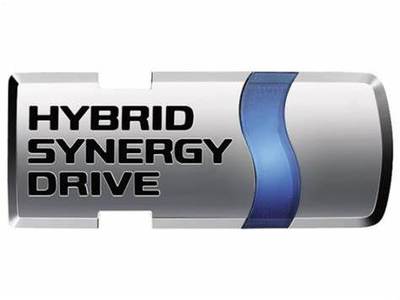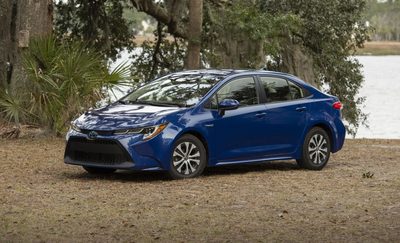New Brazilian Toyota Corolla Hybrid Will Run On Ethanol, Electric or Gasoline
The following is an Auto Channel Green Wheels Report; relevant content for car shoppers and auto enthusiasts concerned with alt-fuels, fuel economy, hybrid vehicles, electric vehicles, fuel-cells and saving our planet by reducing exhaust emissions
In much of the world, the road to electric vehicles may be fueled by ethanol.
SAO PAULO, Brazil - July 10, 2019; The AP wire service reported yesterday that for 22 years, Toyota Motor Corp. has made hybrid cars that don’t require drivers to choose between running on gas or electricity. In October it will add a third option: ethanol.
The Japanese manufacturer will package its ultrapragmatic drivetrain in an all-new Corolla sedan that will be bolted together at its plant in Sao Paulo. Toyota is billing the vehicle as the cleanest hybrid ever made.
Ethanol has long been a popular fuel in Brazil, where it’s brewed fairly efficiently from fast-growing sugar cane. Because the plants process CO₂ as they grow, ethanol is considered a renewable fuel; burning a gallon of it releases only 10% to 20% as much carbon as burning a gallon of traditional gas, according to Unica, a sugar association.
“The goal is to make a car with zero carbon emission; that’s the industry’s race,” said Ricardo Bastos, Toyota’s head of government relations in Brazil. “With ethanol, we’re closer if you consider the whole cycle, well to wheel.”
 |
The chimera car could prove to be a useful stopgap in an industry slowly transitioning to vehicles that exclusively plug in and run on batteries, particularly in countries committed to ethanol. Brazil has supported the fuel as a green alternative since the 1970s, and as a result it’s now available at all 40,000 of the country’s gas stations. Ethanol in Brazil is often cheaper than conventional fuel, depending on the price of sugar at any particular moment.
Electrified vehicles have made little headway in Brazil, in part because of anemic charging infrastructure and taxes of up to 120% on imports such as the Toyota Prius. Of the country’s 44 million cars and trucks, only 11,000 or so were electric as of the end of 2018.
These days, however, almost all new cars in Brazil can burn ethanol or gasoline. Last month, Brazilian policymakers further primed that market for the new Toyota, making tax concessions that will lower the price of hybrid vehicles by as much as 3% for cab drivers and fleet companies. With that sweetener, a hybrid electric vehicle that also burns ethanol could make up 10% of the fleet by 2025, according to some estimates.
Such a machine may also catch on abroad. Starting next year, Toyota plans to export its new ethanol-enabled Corolla to Argentina, Chile, Colombia, Paraguay, Peru and Uruguay. “Any country which already uses ethanol or wants to increase the usage of hybrids is a target,” Bastos said. “If Europe wants it, we have the technology ready.”
In the U.S. nearly all fuel contains a small amount of ethanol, typically up to 15%, according to a federal renewable fuel mandate last updated in 2007. A traditional internal combustion engine can be damaged by more concentrated ethanol, and it’s still tough to find a more refined version. Only 3,400 stations sell a blend of as much as 85% ethanol for purpose-built flex-fuel vehicles, and most of them are clustered in the country’s Corn Belt.
Meanwhile, ethanol has fueled a long-simmering debate. Scientists point out that it’s not as clean as it’s been made out to be, considering the energy required to grow the plants ethanol is derived from and to refine the end product. What’s more, ethanol typically emits more smog than conventional gas and produces fewer miles per gallon.
The hybrid Corolla will be able to run on any of the three fuels or two at the same time. Toyota will make the car with engines from Japan at its Sao Paulo plant, a factory that can churn out as many as 70,000 vehicles a year. The automaker has yet to release pricing or mileage-efficiency estimates for the car.
Response from THE AUTO CHANNEL
To be sure, this is an interesting story. But while neither Bob Gordon nor I are ready to comment on the entirety of the article, I can tell you that the information contained in the second and third paragraphs from the bottom are grossly incorrect.
Higher levels of ethanol-gasoline (E15 and higher) does not damage engines. In fact, to make this claim in a story about Brazil, where the mandated minimum fuel is E27 shows the claim to be absurd on the face of it. Brazil has been using E15 and higher blends since 1978. The vehicles and ICE equipment sold in Brazil is virtually the same as those available in the U.S., Europe and Asia. Brazil will be moving to E40 as soon as about 2025.
As it happens, ethanol is compatible with more types of rubbers, plastics, and metals than gasoline and aromatics. This can be confirmed by consulting compatibility databases and charts such as the ones found at these links:
-
• https://www.customadvanced.com/chemical-resistance-chart.html?chemical=Ethyl+Alcohol&rubber=
• https://www.coleparmer.com/chemical-resistance
• https://www.graco.com/content/dam/graco/ipd/literature/misc/chemical-compatibility-guide/Graco_ChemCompGuideEN-B.pdf
• https://www.calpaclab.com/aluminum-chemical-compatibility-chart/
• http://mykin.com/rubber-chemical-resistance-chart
• https://www.minorrubber.com/compatibility-chart.html
• https://marketing.industrialspec.com/acton/attachment/30397/f-0031/1/-/-/-/-/aluminum-chemical-compatibility-chart-from-ism.pdf
In the next paragraph, the writer claims that "ethanol is not as clean as it was made out to be." This is nonsense considering the long string of studies that show ethanol-gasoline fuels to be much cleaner than ethanol-free gasoline. The latest studies along these lines come from North Carolina State University (NCSU), the University of California Riverside (UCR), and the United States Department of Agriculture (USDA):
-
• https://fixourfuel.com/wp-content/uploads/2018/04/NCSU-Study.pdf
• https://fixourfuel.com/wp-content/uploads/2018/04/UC-Riverside-Study.pdf
• https://www.tandfonline.com/doi/full/10.1080/17597269.2018.1546488
Moreover, while it has again become fashionable for ignoramuses masquerading as fuel/energy experts to claim that ethanol is not clean because its production may utilize filthy petroleum oil fuels somewhere along the production-distribution process, they conveniently ignore all the ancillary and extraneous uses of the filthy petroleum oil fuels that are required to produce, ship, refine, and protect the filthy petroleum oil fuels and the entire the oil industry.
Marc J. Rauch
Exec. Vice President/Co-Publisher
THE AUTO CHANNEL



